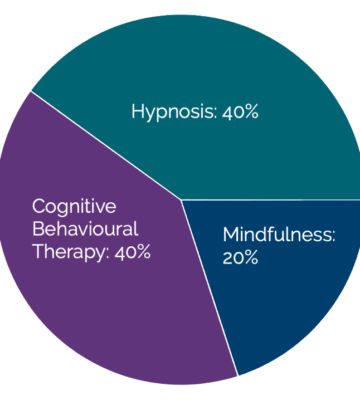- Last Updated
- Posted by
- Hypnotherapy

If you're thinking of starting a new career as a hypnotherapist (or you're wondering if learning hypnotherapy will improve your current practice) then you want to be sure that whatever you learn is going to be effective and helpful.
That's why it's essential to understand what the research says about different types of hypnotherapy — and why, if you care about results (happy clients & more income), you want to learn about the benefits of combining hypnosis and CBT.
Why add hypnosis to CBT?
Why not just learn hypnotherapy on it's own, or why not just learn CBT?
A growing body of evidence shows that adding hypnosis to CBT improves outcomes compared to CBT on its own, and as CBT is the best evidenced psychotherapy, especially for anxiety, then the idea that we can improve on CBT is exciting!
I'll come back to this research later.
But first let's consider: why not just teach hypnosis on it's own?
Why don't you just teach hypnosis on its own?
(Why is so much of your course about CBT and mindfulness?)
Good question!
“Hypnosis on its own” would be simple direct suggestions for symptom reduction, symptom removal and quality of life improvement.
For example:
“Close your eyes, relax and now imagine the following things are true… your discomfort is fading away, your tummy is now calm and comfortable, you fall asleep quickly and sleep through the whole night… etc”
This actually works quite well!
And this relatively simple approach was what gave hypnosis such a huge reputation when it hit the scene in around 1880-1890.
For some conditions this simple approach can be very effective – especially when used creatively for pain control or gut-focused hypnotherapy for gastrointestinal disorders like IBS.
But for longer term behavioural change, for anxiety, for stress, for depression, these simple direct suggestions of improvement are not sufficient. For example hypnosis for weight loss is not effective on it's own, but combined with cognitive-behavioural approaches it IMPROVES results!
Moreover nearly every informed professional does not consider hypnosis to be a therapy in its own right – but rather an ADJUNCT to an existing psychotherapy.
Hypnosis is not a complete therapy in its own right
Hypnosis needs to be added to psychotherapy
OK, but which psychotherapy?
Some approaches have strapped hypnosis onto a psycho-analytic or early developmental trauma model (“we have to regress you back to your childhood to find the origin and source of this issue – else you will never get well”) – resulting in “hypno-analysis”.
(By the way there is no evidence to show that hypnosis increases access to early memories or literal re-experiencing of them. Indeed there is a considerable issue of confabulated and false memories as the whole essence of hypnosis is to make imagination seem real!)
Other approaches have added hypnosis to helping people cope with current problems or adding hypnosis to “reconditioning” therapies that aim to retrain the nervous system to respond more adaptively and flexibly to challenging situations (aka “psychobiological re-education”).
Indeed since around the late 1940s, at the very start of behaviour therapy (which grew into cognitive behaviour therapy), therapists and psychiatrists have been adding hypnosis to behaviour therapy treatments.
So there is a long history of hypnosis and behaviour therapy, and then later, between hypnosis and cognitive therapy.
Coming up to the 21st century, as I mentioned earlier, there is a growing body of evidence that shows that adding hypnosis to CBT improves outcomes compared to CBT on its own.
One of the most cited studies of this was in 1995 when Irving Kirsch and his team analysed 20 studies that compared CBT to CBT+hypnosis.
“the addition of hypnosis substantially enhanced treatment outcome, so that the average client receiving cognitive-behavioural hypnotherapy showed greater improvement than at least 70% of clients receiving nonhypnotic treatment.”
(Kirsch et al, 1995)
In 2021 Nicolino Ramundo, a senior psychologist at the University of West Australia, updated that analysis. Nick and his team found 46 randomised control trial studies that compared CBT alone to CBT with hypnosis.
Their conclusion:
“the adjunctive use of clinical hypnosis can help make CBT a more efficacious and enduring treatment, with 66% of participants at posttreatment, and 72% at follow-up, experiencing better outcomes than their CBT counterparts.” (Ramondo et al, 2021)
As CBT is the best evidenced-psychotherapy this is really encouraging!
You can read about some of that evidence here – but look out for our new in-depth article on the research evidence for combining hypnosis and CBT.
Hypno-CBT® — much more than just CBT+Hypnosis
In our Hypno-CBT® approach we are not merely adding some hypnosis to CBT. In Hypno-CBT® hypnosis is integrated deeply into the CBT model at every juncture.
For example in CBT there is the concept of negative automatic thoughts (NATS) — the negative thoughts that automatically pop into our mind.
In Hypno-CBT® we consider these to be more like negative autosuggestions indicating that the client is already having a hypnotic relationship and responsiveness to these thoughts (all be it a very unhelpful and automatic hypnotic response.)
Therefore we help the client become more aware of both automatic thoughts AND the automatic response and encourage them to step back and observe all that (which is the essence of mindfulness) — this is a sort of DE-HYPNOSIS.
So the first task maybe a sort of dehypnosis and clients learning about their own mental habits and psychology.
A second task can then be learning how to consciously choose to respond to ideas that are more helpful: choosing to respond hypnotically (“as-if-true”) to selected helpful ideas — and of course this is SELF-HYPNOSIS. But a strategic, deliberate, consciously chosen self-hypnosis.
Hypno-CBT® – further integration with CBT — via self-instruction
We can continue this journey further into an investigation of how they talk to themselves and the whole idea of “self-instruction”.
If we observe our experience we will notice that we're constantly talking to ourselves — our internal dialogue is often non-stop!
One of the earliest types of CBT was “self-instruction training” developed by Dr Donald Meichenbaum PhD based on the work of the Russian psychologist Lev Vygostky.
Meichenbaum developed the idea that we could teach children with impulse control or learning challenges how to talk to themselves (self-instruction) and even developed this into “teaching thinking” by helping modify this internal self-talk.
Just as importantly, Meichenbaum applied this idea to working with adults coping with stress, pain and trauma, noting how even adults talk out-loud when they are overwhelmed and stressed as a way to focus and regulate their attention and behaviour (“passports, tickets, money!!”)
Meichenbaum went onto develop very important methods of pain control and the first ever evidence-based treatment for PTSD.

When overwhelmed many adults talk outloud as a way to focus
We can begin to see a relationship between our own internal dialogue (narrative/self-instruction) and the hypnotic stories we tell ourselves or the potential NEW helpful hypnotic stories we tell ourselves.
We can now weave the cognitive-behavioural modification of Meichenbaum's self-instruction with a new script of self-hypnosis.
This is just a couple of examples of the integration between hypnosis and CBT that we cover in Hypno-CBT®
Note:
Look out for the new course we will offering from Dr Donald Meichenbaum:
Developing Expertise and the Narrative Approach in Cognitive Behavioural Psychotherapies
FYI
Dr Donald Meichenbaum's first academic paper was called
“Teaching Schizophrenics to Talk to Themselves”
https://psycnet.apa.org/record/1974-05716-001
References:
Kirsch, I.; Montgomery, Guy; Sapirstein, Guy (1995). ‘Hypnosis as an adjunct to cognitive behavioral psychotherapy’: A meta-analysis.’ Journal of Consulting and Clinical Psychology, 63 (2), 214-220.
Ramondo at al, (2021). ‘Clinical Hypnosis as an Adjunct to Cognitive Behavior Therapy: An Updated Meta-Analysis' International Journal of Clinical and Experimental Hypnosis, 69(2): 169-202
Kroger, William S. & Fezler, William D., ‘Hypnosis & Behaviour Modification: Imagery Conditioning’ (1976).
Kirsch, Capofens et al ‘Clinical Hypnosis and Self-Regulation: Cognitive Behavioural Perspectives' (1999)

